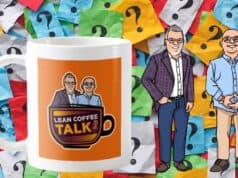Elon Musk tweeted this yesterday: “Please note that Twitter will do lots of dumb things in coming months. We will keep what works & change what doesn't.”

I host a podcast (and am writing a book) about learning from mistakes — as individuals and organizations.
I celebrate the idea that trying to improve means that not everything we try will work out as we would predict.
It's better to admit a mistake, adjust, and move forward instead of being stubborn.
“Keep what works & change what doesn't,” as Elon put it.
Hear Mark read this post — subscribe to Lean Blog Audio
That said, should we aim to be:
1) Planning enough so we have a well-thought-out hypothesis about what we expect to work (being prepared to accept we might be wrong)
and
2) Just randomly trying “dumb things” (a.k.a. throwing spaghetti against the wall to see what sticks)?
I'd argue that we should be closer to the first of those two options.
How do we encourage a culture of continuous improvement without it becoming chaotic? Does anybody feel safe to push back on the boss when they suggest a “dumb thing” that everybody else would predict to be a bad idea?
What's the risk of trying a “dumb thing?” What's the worst that could happen? Those are important questions to ask in different situations. When do we go ahead and just test the “dumb idea” and when do we pause to think about it more, without getting into analysis paralysis? It's all situational, right?
What happens if the ability to admit a mistake becomes an excuse for not properly planning out our improvement experiments?
If we think in terms of Plan-Do-Study-Adjust cycles, does our ability to “Study and Adjust” mean that we don't need to Plan before we Do?
Post a comment below or join the discussion on LinkedIn, where I made a similar post.
Please scroll down (or click) to post a comment. Connect with me on LinkedIn.
Let’s build a culture of continuous improvement and psychological safety—together. If you're a leader aiming for lasting change (not just more projects), I help organizations:
- Engage people at all levels in sustainable improvement
- Shift from fear of mistakes to learning from them
- Apply Lean thinking in practical, people-centered ways
Interested in coaching or a keynote talk? Let’s talk.








